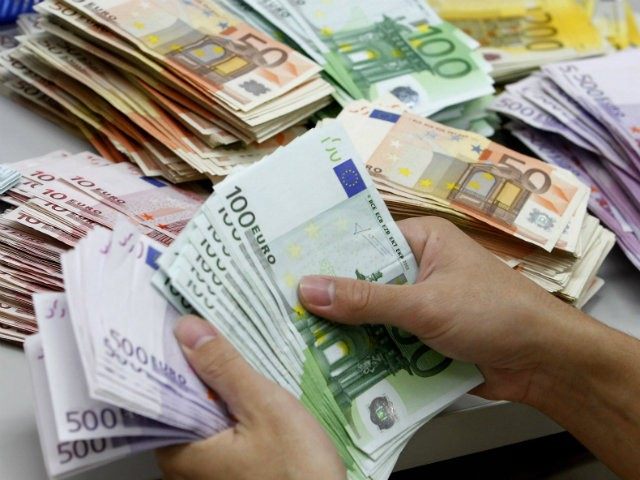The European Central Bank (ECB) gave the Left and their allies meeting in Davos, Switzerland, everything they could have hoped for with the announcement that they have agreed to print $1.13 trillion of new cash to buy the national debt of their insolvent members. But “hidden within the announcement is evidence of Germany’s weakening commitment to the European project,” according to Stratfor.
ECB President Mario Draghi’s decision to undertake quantitative easing allows the 18 nations that have abandoned their local drachmas, lire, deutschemarks, etc. in favor of the euro to directly borrow money and buy their own national debt. The initial bond buying program is more than twice the size expected and includes eurozone peripheral members referred to as the PIIGS: Portugal, Italy, Ireland, Greece, and Spain. More importantly for the Davos crowd, the ECB’s commitment is open-ended for “whatever it takes” to create at least 2 percent inflation.
Although the Left has been screaming for such action over the last eighteen months, Draghi’s primary duty as president of the ECB was to control inflation. But when the eurozone actually fell into deflation of -0.2 percent last month, the ECB Board approved allowing the monetary debasement. But the plan only commits the ECB to buy up to 20 percent of the bonds and delegates 80 percent of the purchases to be bought by individual member’s central banks. This means each country will retain their nation’s default risk.
The structure of the deal will probably not impact the effectiveness of quantitative easing, but the political message is foreboding: “If things go badly, everyone is on their own,” according to Stratfor. This game changer is the first reversal from the process launched in 1951 for a eurozone becoming “an ever closer union,” with the eventual goal of becoming a “United States of Europe.”
The French people, in a national vote, rejected a treaty that would have established a European Union Constitution in 2005. The victory for the “No” campaign was 55 percent on a huge 69 percent turnout. As the second largest economy on the continent, France’s rebuff of a constitution forced the politicians across Europe to continue to make arrangements for ratification for a final unbreakable constitution without a public vote in place.
The new ECB failure to provide an all-member “backstop” for the risk of defaults by the PIIGS is a fatal move away from a true union. In the 2011-2012 crisis, rich countries raised funds to aid their fellow poor members to honor Draghi’s “whatever it takes” financial guarantee of all members’ debt. But the lack of such commitment now is the antithesis of a true union.
It is obvious that Germany refused to be on the hook this time around for another open-ended set of bond guarantees for the PIIGS. German Chancellor Angela Merkel and the Bundesbank have been vocal all year that quantitative easing would be bad for Germany because it involves spending ECB money. As the largest economy in Europe, Germany provides a 17 percent share of ECB funding. In the case of PIIGS defaults, German taxpayers would be stuck with the bill.
When it became clear that deflation was imminent as the global oil price plummeted, Germany realized that a compromise would be necessary. Merkel signed off on an ECB plan but in a manner that loosens the ties that bind the eurozone.
The weakness in the European Union’s design stems from the reality that each individual state pursues its own interest first and Europe’s a distant second. Greece revealed in 2009 that it had been falsifying its financial statements for years to allow higher social spending. The revelations kicked off the economic crisis that peaked with a sovereign bond crisis of 2012.
Socialist France and Italy both refused to comply with the Growth and Stability Pact’s rules that set a hard limit on the percentage of deficit spending for each euro member. But when the European Commission was unwilling to discipline France and Italy, the credibility of the union was trashed.
Germany had historically been the biggest proponent of achieving a United States of Europe. But the structure of the ECB’s quantitative easing means there is no longer a collective resolve to do “whatever it takes” to defend the union. Germany has set up a backdoor for their exit from the euro. By letting the PIIGS borrow all they can, Germany knows the eventual PIIGS defaults will blow up the union.

COMMENTS
Please let us know if you're having issues with commenting.